Co-Curriculum Activities
| Particulars | Description |
| Activity: | Add-on Course on “Flutter for IoT” conducted by EXTC department |
| Sub Activity: | Hands-on Training / Workshop (One week) |
| Activity Level: | Department of EXTC, SLRTCE |
| Title: | Flutter for IoT for S.E. – Enhance app development skills and dive deeper into IoT for T.E. |
| Organized by: | EXXC Department Coordinator |
| Venue: | Room No. 410 |
| Date / Duration: | 30/06/2025 to 5/07/2025 |
| Time: | 9:30 AM – 4:30 PM |
| Targeted Students: | SE & TE |
| Total Participants: | 18 |
| Objectives: | To enhance app development skills and dive deeper into IoT integrations, real-time data, and security, enabling students to design and develop simple IoT-enabled apps. |
| Takeaways from the session: | This add-on course provided an in-depth, hands-on introduction to mobile application development using Flutter, Google’s UI toolkit, and its integration with IoT devices using Arduino and Bluetooth communication. Students began by learning the fundamentals of Dart programming, Flutter architecture, and widget-based UI design. The course included the development of real-world app features such as Login and Registration screens, navigation, form validation, and custom UI elements using widgets like Text, Column, Container, and ElevatedButton. In the final phase, students created a Bluetooth-controlled Flutter app that communicated with an Arduino board to control hardware components like LEDs. This enabled them to apply cross-platform software skills to physical computing systems. |
| Outcomes (Mention if relevant to PO/PSO): | Students will be able to achieve:
|
| Name and Dated Signature of Coordinator | Mr. Aditya Desai Mrs. Hemangi Satam |
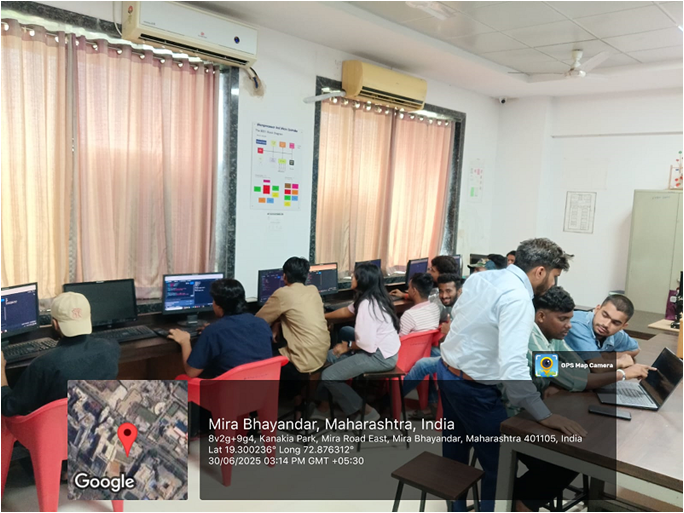
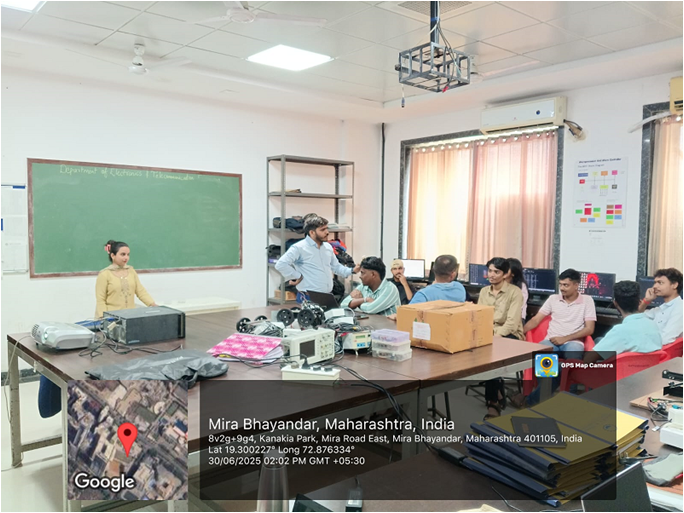
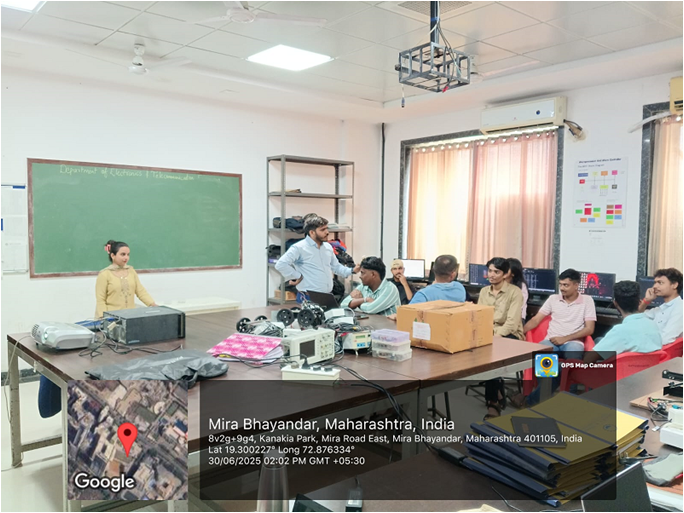
| Particulars | Description |
| Activity: | Workshop on “Hands On training on latest FPGA boards” conducted by EXTC department |
| Sub Activity: | Hands-on Training (One day) |
| Activity Level: | Department of EXTC, SLRTCE |
| Title: | Hands On training on latest FPGA boards |
| Organized by: | Mini Project 2B Coordinator |
| Venue: | Room No. 410, Shree L.R. Tiwari College of Engineering |
| Date: | 15th February, 2025 |
| Time: | 10:00 AM – 4:00 PM |
| Number of participants: | 20 |
| Speaker(s) and Designation: | 1) Mr. Aryan Amare, Student, BE EXTC 2) Mr. Jagdish Choudhary, Student, TE EXTC |
| Objectives: |
|
| Knowledge Acquired from the Seminar: | The session started with an introduction to FPGA technology and its applications in real-world electronics. The participants learned about different FPGA boards, with a special focus on Xilinx Spartan 3A and Spartan 3AN.
Students were introduced to Verilog, a hardware description language used for FPGA programming. The trainers explained the fundamental concepts of Verilog coding and how to write simple programs for hardware implementation.
A step-by-step guide was provided on running code on FPGA boards. The session covered:
|
| Conclusion: | The seminar provided a valuable learning experience for students interested in FPGA technology. By working with Xilinx tools and Verilog, they gained practical skills in hardware programming and debugging. The hands-on training with Spartan 3A and Spartan 3AN boards helped students bridge the gap between theoretical knowledge and real-world applications. The session was interactive, with students actively participating in coding exercises and problem-solving tasks. Overall, the seminar successfully enhanced students’ understanding of FPGA-based systems and encouraged them to explore further opportunities in this field. Furthermore, the completion of the Half Adder project gave students practical exposure to designing and implementing fundamental digital circuits on FPGA hardware. |
Glimpses of the Event:
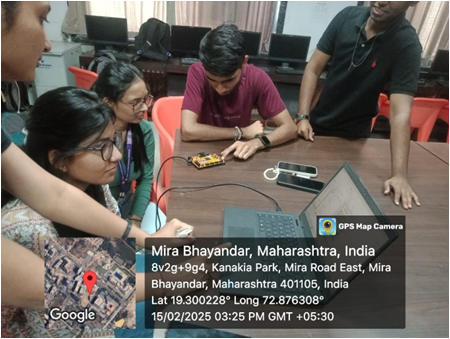
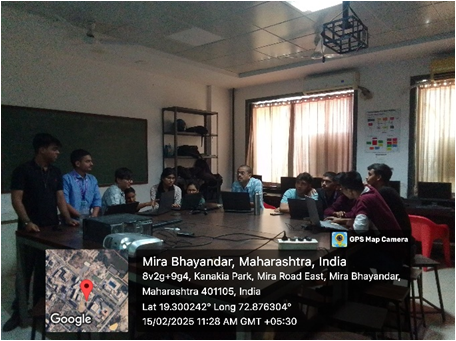
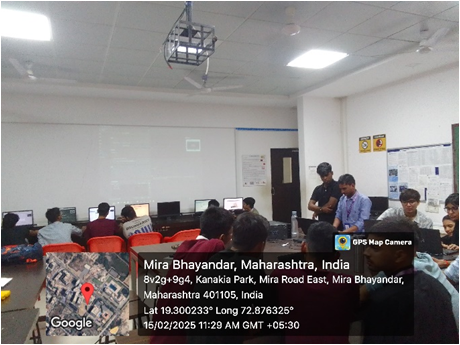
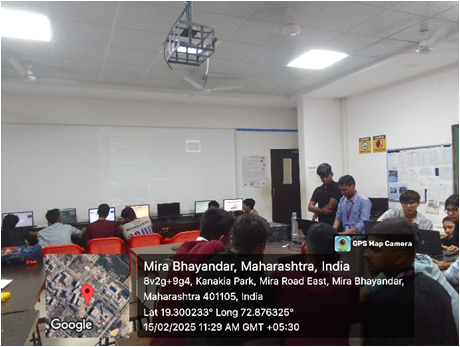
| Particulars | Description |
| Activity: | Workshop on “Arduino on Cloud” conducted by EXTC department |
| Sub Activity: | Project Competition (One day) |
| Activity Level: | Department of EXTC, SLRTCE |
| Title: | Workshop on “Arduino on Cloud” |
| Organized by: | Mini project 1B Coordinator |
| Venue: | Offline |
| Date: | 21st February, 2025 |
| Time: | 10:00 AM – 12:00 PM |
| Objective of event: |
|
| Outcome of event: |
|
| Targeted Participants: | 60 |
| Total Participants: | 32 |
| Speaker: | Rajesh Kushalkar (Sr. Project Manager at IIT Bombay) |
| List of distinguished guest present during opening ceremony: | HOD EXTC, Faculty |
| List of distinguished guest present during closing ceremony: | HOD EXTC, Faculty |
| Content of the activity: | Better understanding and getting to know ideas about ARDUINO Board |
| Methodology used: |
|


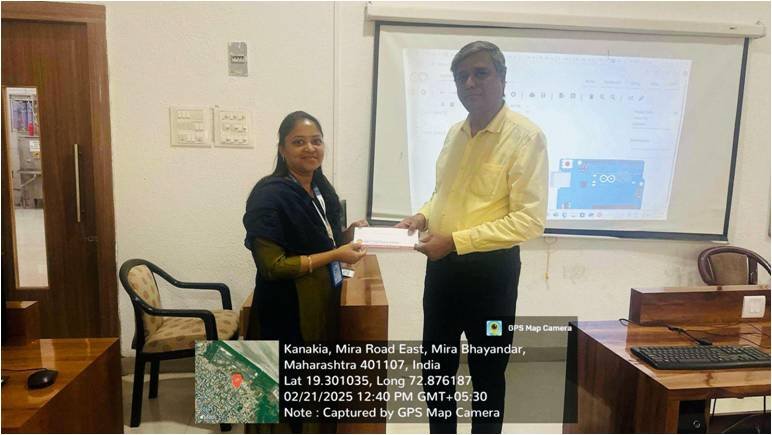
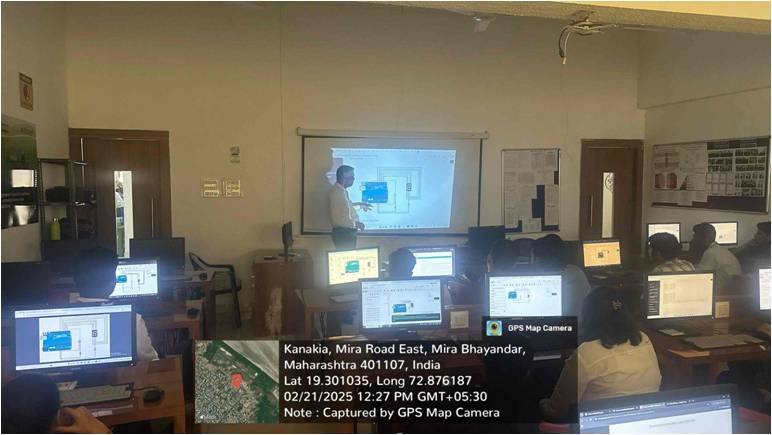
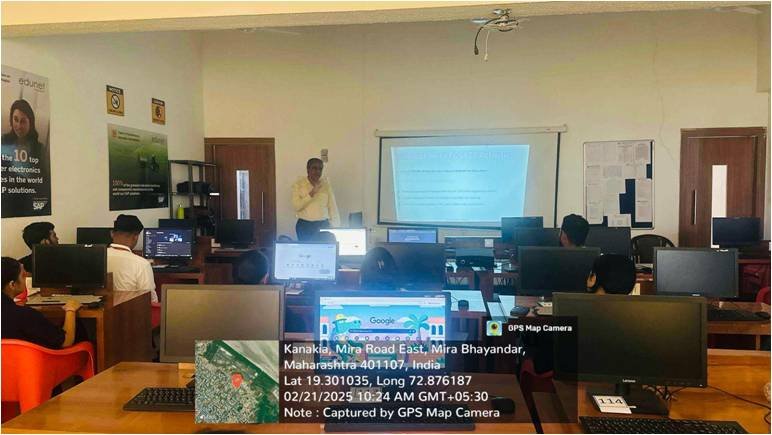
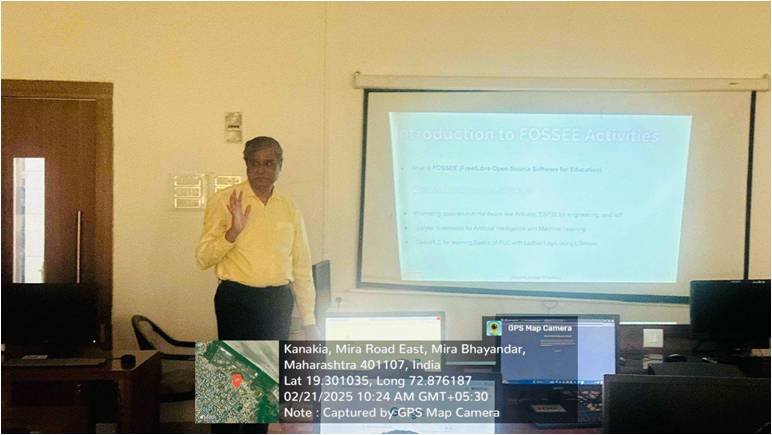
| Particulars | Description |
| Activity: | Technical |
| Sub Activity: | Workshop |
| Activity Level: | Institute |
| Title: | Workshop on STM-32 |
| Organized by: | Department of Electronics and Telecommunication Engineering |
| Venue: | Lab 410 |
| Date: | 04/10/2024 |
| Time: | 9:00 AM – 4:00 PM |
| Introduction: | An exciting workshop was organised on STM32 microcontrollers, led by our senior students. The session covered the fundamentals of STM32 architecture and provided hands-on experience with programming and application development. Participants engaged in practical exercises, enhancing their skills in embedded systems. It was a fantastic opportunity to learn from our seniors and dive into the world of STM32! |
| Participants: |
|
| Agenda: |
|
| Key Takeaways: | The STM32 workshop provided participants with valuable insights into embedded systems and microcontroller programming. Attendees gained hands-on experience with STM32 development tools and learned essential coding techniques. Key takeaways included understanding the architecture of STM32 microcontrollers, effective interfacing with peripherals, and practical debugging methods. Participants also developed a simple project, reinforcing their learning through practical application. Overall, the workshop enhanced skills and confidence in working with embedded systems, preparing attendees for future projects. |
| Conclusion: | In conclusion, the STM32 workshop was a resounding success, equipping participants with essential knowledge and practical skills in embedded systems. The hands-on experience and interactive discussions fostered a deeper understanding of STM32 microcontrollers. Attendees left inspired and motivated to apply their newfound skills in future projects. We extend our gratitude to our senior students for their guidance and support, and we look forward to more such collaborative learning experiences in the future. |
| Methodology used: | PPT, Demonstration, Hands-on Practice |
| Particulars | Description |
| Activity: | Non-Technical |
| Sub Activity: | Activity |
| Activity level: | Inter Department |
| Title: | Yoga: Path towards inner engineering |
| Organized by: | Department of Electronics & Telecommunication Engineering |
| Venue: | SLRTCE Seminar Hall |
| Date: | 30/ 07/ 2024 |
| Time: | 3:00pm-4:30pm |
| Objective of event: |
|
| Expected Outcomes of event : | The Inner Engineering and practice session by the Isha Foundation provided valuable insights into the importance of self-care and mindfulness. The event was a reminder of the power of yoga and meditation as tools for personal transformation. As students, we left the session with a greater understanding of how to cultivate a balanced and harmonious life. Overall, the session was a significant step towards promoting holistic well-being within the college community, and we look forward to more such enriching experiences in the future. |
| Targeted Participants : | S.E., T.E, B.E |
| Total Participants: | 61 |
| Speaker: | Ms. Anjali Mane, Ms.Sukhada Vaidya, Ms. AsharaniRawat, Mr.DayanandShettigar, Isha Foundation Volunteers |
| Content of the activity : | Following the theoretical insights, the session transitioned into a practical segment, where participants engaged in guided yoga practices. The instructors, trained by the Isha Foundation, led the group through a series of asanas (yoga postures), pranayama (breathing exercises), and meditation techniques.
|
| Methodology used: |
|


| Particulars | Description |
| Activity: | Technical |
| Sub Activity: | Alumni Interaction |
| Activity level: | Department |
| Title: | Alumni Interaction |
| Organized by: | Department of Electronics & Telecommunication Engineering |
| Venue: | 407 |
| Date: | 2ndAugust 2024 |
| Time: | 3:00pm-4:30pm |
| Objective of event: |
|
| Expected Outcomes of event : | The Alumni Interaction Session was a resounding success, achieving its objective of connecting students with alumni to provide guidance, mentorship, and inspiration. The event fostered a sense of community and demonstrated the ongoing commitment of the university to support its students’ career development. Plans are underway to organize similar events regularly to maintain and strengthen the alumni-student bond. |
| Targeted Participants : | S.E., T.E, B.E |
| Total Participants: | 54 |
| Speaker: | Mr.Roshan Chaturvedi,Alumni batch 2019,Founder of TRRev Technology and Just Academy |
| Content of the activity : | ● Real-World Insights: Mr. Chaturvedi shared valuable real-world experiences that complemented academic knowledge, providing students with a more comprehensive understanding of the technology industry. ● Career Guidance: Practical advice on career planning, job search strategies, and skills development was highly appreciated by the students. ● Inspirational Stories: Mr. Chaturvedi’s story of perseverance and success served as motivation for students to pursue their goals with determination and resilience. |
| Methodology used: |
|




| Particulars | Description |
| Activity: | Expert lecture |
| Sub Activity: | Seminar on Research Methodology |
| Activity level: | Department level |
| Title: | Elements of Research Methodology and technical writing |
| Organized by: | Department of Electronics & Telecommunication, SLRTCE |
| Venue: | 406 classroom, EXTC, SLRTCE |
| Date: | 4th August 2023 |
| Time: | 02:00pm to 03:00pm |
| Objective of event: |
|
| Outcome of event: | The seminar’s expected outcomes include heightened research proficiency, improved technical writing skills, ethical awareness, proficient data handling, effective problem-solving abilities, enhanced collaboration and networking, successful publication and dissemination endeavors, improved time management, increased confidence, and a commitment to continued learning and application. These outcomes collectively contribute to participants’ growth as adept researchers and effective communicators within their respective domains. |
| Targeted Participants: | BE Students |
| Total Participants: | 47 |
| Particulars | Description |
| Activity: | Workshop followed by a Project Competition on “STM32/MSP 430 and Arduino Boards” |
| Sub Activity: | Workshop and Project Competition (two day) |
| Activity level: | Department of EXTC SLRTCE Under IETE |
| Title: | Workshop followed by a Project Competition on “STM32/MSP 430 and Arduino Boards” |
| Organized by: | IETE coordinator |
| Venue: | offline |
| Date: | 24th and 25th August 2023 |
| Time: | 9am-5pm |
| Objective of event: |
|
| Outcome of event: |
|
| Targeted Participants: | Third year of SLRTCE |
| Total Participants: | 25+ EXTC(Faculty) |
| Speaker: | Prof. Dr. Umesh Bhadade Mr.Aditya Desai |
| List Of distinguished guest present during opening ceremony: | HOD EXTC,Faculty |
| List of distinguished guest present during closing ceremony: | HOD EXTC,Faculty |
| Content of the activity: | Better understanding and getting to know Ideas about STM32 /MSP430 ARDUINO Board |
| Methodology used: |
|
|
| Particulars | Description |
| Activity | Non-Technical |
| Sub activity | Guest Lecture |
| Activity Level | Institute |
| Title | Customer Support Training for Admin Staff |
| Organized by | Electronics And Telecommunication Engineering department and IQAC |
| Venue | Seminar hall |
| Date | 29/06/2022 |
| Time | 2:00 pm to 3:30 pm |
| Objective of event |
|
| Targeted Participants | Non-Teaching staff |
| List of Distinguished guest present during the opening ceremony |
|
| Speaker | Ms. Nisha Batra, Administrative head, RIS |
| Total Participants | 22 |
| Content of the activity |
|
| Outcomes of seminar: |
|
| Methodology used | PPT |
| Particulars | Description |
| Activity | IETE |
| Sub activity | Guest Lecture |
| Activity Level | Departmental |
| Title | “Animation using Python Turtle Graphics” |
| Organized by | Electronics And Telecommunication Engineering department |
| Venue | Offline |
| Date | 21/02/23 |
| Time | 3 to 5pm |
| Objective of event | To make students understand about python programming skill for animation |
| Targeted Participants | Second, Third and Final year |
| List of Distinguished guest present during the opening ceremony |
|
| Speaker | Mr. Pratham Maurya is Senior developer and server administrator at wipro and Mr. Suraj Bhul |
| Total Participants | 33 |
| Content of the activity |
|
| Methodology used | PPT and Handson followed by activity |
| Particulars | Description |
| Activity | Technical |
| Sub activity | Guest Lecture |
| Activity Level | Departmental |
| Title | Challenges of Cyber security |
| Organized by | Electronics And Telecommunication Engineering department |
| Venue | Offline, classroom 408 |
| Date | 28/09/2022 |
| Time | 10:15am-11:15am |
| Objective of event |
|
| Targeted Participants | TE and BE |
| List of Distinguished guest present during the opening ceremony |
|
| Speaker | Mr. Noaman Khatri |
| Total Participants | 60 |
| Content of the activity | To motivate and enhance capabilities of students and provide guidance about the latest technologies in the industry. |
| Methodology used | PPT and hands-on |
| Particulars | Description |
| Activity | Technical |
| Sub activity | Guest Lecture |
| Activity Level | Departmental |
| Title | Opportunities in Renewable Energy |
| Organized by | Electronics And Telecommunication Engineering department |
| Venue | Offline, classroom 408 |
| Date | 13/11/2022 |
| Time | 10:15am-11:15am |
| Objective of event |
|
| Targeted Participants | SE, TE and BE |
| List of Distinguished guest present during the opening ceremony |
|
| Speaker | Mr. Amul Mehta. |
| Total Participants | 55 |
| Content of the activity |
|
| Methodology used | PPT |
| Particulars | Description |
| Activity | Technical |
| Sub activity | Guest Lecture |
| Activity Level | Departmental |
| Title | Interactive Session by Alumni |
| Organized by | Electronics And TelecommunicationEngineering department |
| Venue | Online mode (Google meet) |
| Date | 19/04/2022 |
| Time | 12:00-1:30pm |
| Objective of event | 1.To give an insight of the corporate world and get learnings from their experience. 2.To build a connection between alumni and current academic year students. |
| Targeted Participants | Second ,Third and final year |
| List of Distinguished guest present during the opening ceremony | 1) MrsAboli Moharil (HOD,EXTC) 2) Mrs. Hemangi Satam, 3) Mrs. Dipti Kale |
| Speaker | 1) Mr. Noaman Khatri Technical Engineer (Security)Hitachi 2) Mr. Satej Hatalkar IT OSS/BSS ONEOTT iNTERTAINMENT Ltd., Alumni batch 2019 |
| Total Participants | 85 |
| Content of the activity | 1.Topics from the cyber security domain and industry requirements 2. A brief introduction about the CRM, OSS, and BSS, along with their usage and importance in the organization. |
| Methodology used | PPT |
| Particulars | Description |
| Activity | Technical |
| Sub activity | Guest Lecture |
| Activity Level | Departmental |
| Title | Scope of Electronics and Telecommunication in Defense sector |
| Organized by | Electronics And TelecommunicationEngineering department |
| Venue | Online mode (Google meet) |
| Date | 18/04/2022 |
| Time | 1:00pm-2:30pm |
| Objective of event | 1) To acquaint students for the needs of technologies related to defense & security of nation. 2) To provide knowledge about scope of Electronics and Telecommunication in Defense Sector. 3) To provide knowledge to the students about the learning of the electronics systems requirement for military environment. 4) To know about different career opportunities in Defense sector. |
| Targeted Participants | Second ,Third and final year |
| List of Distinguished guest present during the opening ceremony |
1) Mrs Aboli Moharil (HOD,EXTC) 2) Mrs. Hemangi Satam, 3) Mrs. Dipti Kale |
| Speaker | Dr. Nitin S. Kulkarni, Associate Professor, MET’s Institute of Management |
| Total Participants | 113 |
| Content of the activity |
1.Significance of Defence & Aerospace Sector in Indian Context. 2.Current Indian Scenario 3.The Road Ahead Opportunities for Electronics and Telecommunication Engineering Students |
| Methodology used | PPT |
| Particulars | Description |
| Activity | Technical |
| Sub activity | Guest Lecture |
| Activity Level | Departmental |
| Title | Applications of Microwaves and its career options |
| Organized by | Electronics And TelecommunicationEngineering department |
| Venue | Online mode (Google meet) |
| Date | 19/02/2022 |
| Time | 10:00 am to 11:30 am |
| Objective of event | 1) To make students aware of different applications of microwave in practical life. 2) To know about different career options available in the field of Microwave Engineering and know how to prepare yourself for this field. |
| Targeted Participants | Second ,Third and final year |
| List of Distinguished guest present during the opening ceremony |
1) Mrs. Aboli Moharil (HOD,EXTC) 2) Mrs. Hemangi Satam, 3) Mrs. Dipti Kale |
| Speaker | Mr. Tapas K. Bhuiya, Scientist, SAMEER, (IIT Bombay) |
| Total Participants | 67 |
| Content of the activity | Explanation about Electromagnetic Spectrum, types of electromagnetic radiation. applications of RF/Microwaves |
| Methodology used | PPT |
| Particulars | Description |
| Activity | Technical |
| Sub activity | Guest Lecture |
| Activity Level | Departmental |
| Title | Recent trends in Telecommunication |
| Organized by | Electronics And Telecommunication Engineering department |
| Venue | Online mode (Google meet) |
| Date | 4/12/2021 |
| Time | 10:30 am to 11:30 am |
| Objective of event | 1)To give students insight of telecommunication 2) Scope in the Field of telecommunication and career perspectives in the field of telecommunication. |
| Targeted Participants | Second year |
| List of Distinguished guest present during the opening ceremony | 1) Mrs Aboli Moharil (HOD, EXTC) 2) Mrs. Hemangi Satam,3) Mrs. Dipti Kale |
| Speaker | Mr. Shoeb Shaikh, Assistant Professor in VIVA Institute of Technology |
| Total Participants | 25 |
| Content of the activity | The importance of skill set for job hunting and technical growth and knowledge, and also the better fields majorly made for telecommunication students |
| Methodology used | PPT |
Particulars | Description |
Activity | Technical |
Sub activity | Guest Lecture |
Activity Level | Departmental |
Title | Career in IT: Myths and Facts |
Organized by | Electronics And Telecommunication Engineering department |
Venue | Online mode (Google meet) |
Date | 25/08/2021 |
Time | 3:00 pm to 4:00 pm |
Objective of event | Discussion on different myths And realities while working in an IT company. |
Targeted Participants | Third and Final year |
List of Distinguished guest present during the opening ceremony | 1) Mrs Aboli Moharil (HOD, EXTC) 2) Mrs.Zainab Mizwan 3) Mrs.Hemangi Satam,4) Mrs. Dipti Kale 5) Mrs. Swapna Patil,6) Mrs. Sonali Padalkar, 8) Mr. Sandeep Dwivedi |
Speaker | Mr. Sachin Singh, Splz Associate Infrastructure Engineer, Mphasis Ltd., Managing Consultant, Capgemini Invent |
Total Participants | 38 |
Content of the activity | 1)Importance of Self-Assessment point 2) Explore career opportunities 3) developing interest to learn new concepts |
Methodology used | PPT |
Particulars | Description |
Activity | Technical |
Sub activity | Guest Lecture |
Activity Level | Departmental |
Title | The Future of work, &, How it will have a direct influence in your life. |
Organized by | Electronics And Telecommunication Engineering department |
Venue | Online mode (Google meet) |
Date | 25/09/2021 |
Time | 2:00 pm to 3:00 pm |
Objective of event | The webinar’s core idea was to give students insight into the challenges that await them Post-college life & how to deal with them. |
Targeted Participants | Second and Third year |
List of Distinguished guest present during the opening ceremony | 1) Mrs Aboli Moharil (HOD, EXTC) 2) Mrs.Zainab Mizwan 3) Mrs. Hemangi Satam,4) Mrs. Dipti Kale 5) Mrs. Swapna Patil,6) Mrs. Sonali Padalkar, 7) Mr. Sandeep Dwivedi |
Speaker | Mr. Akhil Chandna, CEO of Arcforyou & Alumni of 2018 EXTC batch |
Total Participants | 74 |
Content of the activity | The session helped the students think proactively, by navigating around basic methods and adopting an out-of-the-box approach. |
Methodology used | PPT |
| Particulars | Description |
| Activity | Technical |
| Sub activity | Guest Lecture |
| Activity Level | Departmental |
| Title | Project management |
| Organized by | Electronics And Telecommunication Engineering department |
| Venue | Online mode (Google meet) |
| Date | 15/05/2021 |
| Time | 11:00 am to 1:00 pm |
| Objective of event | To make students understand about building projects and working in teams. |
| Targeted Participants | Second,Third and Final year |
| List of Distinguished guest present during the opening ceremony | 1)Dr. Umesh Bhadade (Professor) 2) Mrs Aboli Moharil (HOD, EXTC) 3) Mrs.Hemangi Satam,4) Mrs. Dipti Kale 5) Mrs.Menka Singh,6) Mrs.Sonali Padalkar,7) Mr. Aditya Desai ,8) Mr. Sandeep Dwivedi |
| Speaker | Mr. Yatin Kandalgaonkar, Managing Consultant, Capgemini Invent |
| Total Participants | 140 |
| Content of the activity | 1)Importance of project management 2) Significance of planning in project 3) Relevance of project in career phase. |
| Methodology used | PPT |
| Particulars | Description |
| Activity | Technical |
| Sub activity | Guest Lecture |
| Activity Level | Departmental |
| Title | Modern Workspace Skills for Fresher’s & How to be Job Ready |
| Organized by | Electronics And Telecommunication Engineering department |
| Venue | Online mode (Google meet) |
| Date | 22/04/2021 |
| Time | 4:00 pm to 5:30 pm |
| Objective of event | To give students insight into the challenges that await them post-college life & how to deal with them. |
| Targeted Participants | Third and Final year |
| List of Distinguished guest present during the opening ceremony | 1)Dr. Umesh Bhadade 2) Mrs Aboli Moharil (HOD, EXTC) 3) Mrs.Hemangi Satam,4) Mrs. Dipti Kale 5) Mrs.Menka Singh,6) Mrs.Sonali Padalkar,7) Mr. Aditya Desai ,8) Mr. Sandeep Dwivedi |
| Speaker | Mr. Akhil Chandna, Alumni and CEO arcforu |
| Total Participants | 80 |
| Content of the activity | To give importance of Modern workspace skills of Collaboration, Communication, Creative thinking & Critical thinking |
| Methodology used | PPT |
| Particulars | Description |
| Activity | Technical |
| Sub activity | Guest Lecture |
| Activity Level | Departmental |
| Title | Impedance matching Techniques in Microwave |
| Organized by | Electronics And Telecommunication Engineering department |
| Venue | Online mode (Google meet) |
| Date | 23/11/2020 |
| Time | 11:00 am to 12:00 noon |
| Objective of events | 1)To make students know that Impedance matching is one of the important aspects of high frequency circuit analysis. 2)To explain various impedance matching techniques |
| Targeted Participants | Final year |
| List of Distinguished guest present during the opening ceremony | Mrs.Aboli Moharil (HOD EXTC) |
| Speaker | Dr.Mamta Kurvey, APSIT |
| Total Participants | 37 |
| Content of the activity | 1)Introduction to impedance matching techniques 2) Narrow-Band Methods Lumped element Matching Stub Tuners |
| Methodology used | PPT |
| Particulars | Description |
| Activity | Technical |
| Sub activity | Guest Lecture | Activity Level | Departmental |
| Title | Network Analysis and Synthesis |
| Organized by | Electronics And Telecommunication Engineering department |
| Venue | Online mode (Google meet) |
| Date | 20/11/2020 |
| Time | 2:30 pm to 3:30 pm |
| Objective of event | 1)To make student understand about network theory 2) To make them learn Network synthesis is a design technique for linear electrical circuits. |
| Targeted Participants | Second year |
| List of Distinguished guest present during the opening ceremony | Mrs. Priyanka Malgi (Assistant Professor, EXTC) |
| Speaker | Mrs. Manisha Samant, APSIT |
| Total Participants | 46 |
| Content of the activity | 1) Introduction to Network theory concept 2) Two port network parameters 3) Two terminal network synthesis |
| Methodology used | PPT |
Title of the Seminar: Cyber Security and Laws
Date/Duration: 30/07/2019
Venue: Seminar Hall
Number of participants: 127
Speaker(s): Advocate Mr. Pankaj Bafna
Designation: Managing Partner at Bafna Law Associate.
Objectives:
With increasing struggle for placements in the competitive world. To give the statics information regarding the need of Cybersecurity Personnel in almost all organizations; guiding new opportunities to students for becoming a Cybersecurity Personnel.
Target Groups: Final year students.
Knowledge acquired by the seminar:
The Importance for cyber security in the present digital world was discussed at large. Student were made aware of various laws pertaining to different aspect of cybercrime e.g. Bank Fraud, Sim Swap fraud, Social media defamation etc. Student were made aware about Different career option in this upcoming field.
Title of the Workshop: Drone and Aviation with programming
Date/Duration: 4th and 5th April 2019
Venue: 411
Number of participants: 40
Objective:
Course Content:
2 days’ workshop covered the following aspects of Drone:
- Introduction of Drones
- Application of Drones
- Types of Drones
- Dynamics and Aerial
- Stability and control
- Motors
- Propellers
- Battery
- Building instructions
- Flying instructions
- Construction of Drone
- Programming of Drone
Certificates of participation were allotted to the participants. Exam was conducted for the same, along with that the grade certificates were given to the students based on their performance.
Title of the Seminar: Top 5 trending jobs in cyber security & How to get One
Date/Duration: 12/03/2019
Venue: Room No. 407
Number of participants: 69
Speaker(s): Mrs. Sonal Misal
Designation: Founder & Director
Objectives:
With increasing struggle for placements in the competitive world. To give the statics information regarding the need of Cybersecurity Personnel in almost all organizations; guiding new opportunities to students for becoming a Certified Ethical Hacker (CEH).
Target Groups: Third and Final year students.
Knowledge acquired by the seminar:
The various profiles for recruitment under Cybersecurity were discussed among which the 5 most trending ones were Cybersecurity Analyst, Network Engineer, Security Architect, Cybersecurity Manager and Chief Information Security Officer (CISO). The objectives behind pursuing the CEH v10 course was explained in detail. Her captivating attitude left an indelible mark on the audience.
Narrative Report of Seminar
Title of the Seminar: Mission I M POSSIBLE
Date/Duration: 26/09/2018
Venue: Room No. 407
Number of participants: 43
Speaker(s): Mrs. Archana Mantri
Designation: Entrepreneur
The seminar includes following topics:-
Our growth and progress in life is limited, by the thoughts and beliefs we carry in our day to day living. Mission I M P O S S I B L E is a program to prepare budding leaders, to achieve anything which they wish to achieve in their life.
Through a process of reflective conversation the program made the audience aware of the fact that, what we are today is the outcome of our past actions. Continuing with the same actions, will deliver the same results in future.
If we plan to have a better future, it calls for change from within. By thinking and believing differently, things which appear impossible, can be brought in the realms of possibility.
Target Groups: Second year students.
Knowledge acquired by the seminar:
In this seminar the speaker talked about how one can prepare for change on three planes:
- Physical – Improving Health and Stress Management
- Mental – Creating and Manifesting Change
- Emotional – Cultivating healthy relationships which are the foundation for happiness and success in life
At the end of the program, the audience start believing I M POSSIBLE which is our mission.
Narrative Report of Seminar
Title of the Seminar: The Unbeatable Professional: How to beat yourself keeping the end game in mind
Date:24/09/18
Venue: 301
Number of participants: 60
Speaker(s): Mr Rohan Gawande
Designation: Business Associate, Proexcellous School
Objectives:
The seminar presentation is an important aspect of engineering students to gain more knowledge and strong skills for their brighter career. Points covered in seminar:
1) Who is an Unbeatable Professional?
2) Do you have in it you to be one?
3) What are the tools required to be one?
4) How the set your professional goal?
5)Which are the professions of the future?
6)How to map your journey towards future?
7)How to beat yourself every time?
8)How to reinvent yourself professionally every time?
Target Groups: Third year students.
Knowledge acquired by the seminar:
- Session of the lifetime before starting your career
- Will remove all confusion from your mind regarding your career
- You will know the real skills required to become a true professional
- You will come out of session with tools to map your career
Narrative Report of Seminar
Title of the Seminar: Scope of Basic Communication Systems
Date/Duration:6/03/2018
Venue: Room No. 302
Number of participants:79
Speaker(s): Mrs. Amrita Rooperi
Designation: Associate Professor
Objectives:
The seminar presentation is an important aspect of engineering students to gain more knowledge and strong skills for their brighter career. Communication system is a collection of all the components starting from input transducer, transmitter, transmission channel to receiver and finally the output transducer. The detail knowledge of all these components is necessary for the study of any communication system.
Target Groups: Second year students.
Knowledge acquired by the seminar:
In this seminar the speaker talked about the basic blocks involved in a communication system. What are different modulation schemes and which modulation technique should be used for a particular application that was discussed. The speaker also talked about the different types of antennas used for transmission of a signal and inspired students to do research in this area.
Narrative Report of Workshop
Title of the Workshop: IOT
Date/Duration: 9th, 11th,12th October 2017
Venue: 404,411,410
Number of participants: 64
Objective:
Course Content
- Understanding and Introduction to Raspberry Pi 3 (1Hrs)
- What is SOC?
- Versions of Raspberry Pi & Their Difference
- Raspberry Pi 3
- Basics of Electronics
- Hardware Description
- Pin Configuration
- OS Installation on SD Card (30Mins)
- Downloading Image
- Study Various Operating Systems Available
- Making SD Card: Formatting and Partitions
- Raspberry Pi SD Installer
- OS Configuration (30Mins)
- Booting Into Desktop
- GUI Version
- CLI Desktop
- Changing Timezone
- Other Options
- Raspi-Config
- Test
- Network Setup (30Mins)
- Setting Up Using GUI
- Setting Up Using Command Line
- Finding Pi’s IP Address
- Connecting with Wi-Fi/ LAN/ Datacard
- GPIO (1hrs)
- Study GPIO Pins
- Libraries Using Git
- Configuring GPIO Pins
- Pi using SSH (30Mins)
- Enabling SSH
- Logging in using Putty
- Run Basic Commands
- Use GPIO
- Linux (1Hrs)
- Understanding Linux
- File Structure
- Linux Commands
- Permissions
- Using Python (4Hrs)
- Understanding Python
- Interpreted Languages
- Variables, Keywords, Operators and Operan• Data Types in Python
- Flow Control
- Condition Statement
- Loops
- Importing Libraries
- Functions
- Classes
9.Implementing OOP’s Using C# (3Hrs)
- Overview to C# contructs
10.Implementing ASP.NET using C# (2Hrs)
- What Is A Web Service
- Technologies
- HTTP
- Looking At HTTP
- XML & SOAP
- WSDL
10.How ASP.NET Web Services Work (3:30 Mins)
- Consuming Web Services
- Creating The Web API Project
- Creating The User Controller
- Adding Methods
- Adding Get And Post
- Testing The API
- Implementing Put
For BE EXTC students by Dr. Ameya Naik on 29th September 2017 (Friday, Time: 1.00 pm onwards)
The seminar includes the following topics
IMAGE PROCESSING
• Fundamentals of Image Processing
• Image description and representation
• Practical aspects of Image Processing
• Case studies related to Image Processing.
VIDEO PROCESSING
• Fundamentals of Video Processing.
• Various aspects to be considered for practical Video Processing
• Case studies related to Video Processing
Industrial Visit Report
On
15th Sep’2017 to Reliance Communication, Ghansoli
 There was a visit arranged for TE,EXTC A students for an Industrial visit to Relaince Communication 4G plant in Ghansoli on 15th Sep’2017.
There was a visit arranged for TE,EXTC A students for an Industrial visit to Relaince Communication 4G plant in Ghansoli on 15th Sep’2017.
Students gained lots of knowledge and awareness regarding recent trends in wireless cellular scenario.4G is the fourth generation of broadband cellular network technology, succeeding 3G. A 4G system must provide capabilities defined by ITU in IMT Advanced.We got into the in-depth view on the technologies being considered for Long Term Evolution-Advanced (LTE-Advanced). First, the evolution from third generation (3G) to fourth generation (4G) is described in terms of performance requirements and main characteristics. The new network architecture developed by the Third Generation Partnership Project (3GPP), which supports the integration of current and future radio access technologies, is highlighted. Then, the main technologies for LTE-Advanced are explained, together with possible improvements, their associated challenges, and some approaches that have been considered to tackle those challenges.
In all it was a very interactive and knowledgeable trip for all of us.
Faculty Incharge H .O. D
Sweta Jha Prof.Zainab Mizwan
Darshan Shah
The seminar includes following topics.
1.Focused on revised syllabus of EDC I
2.Basic concepts and working of semiconductor material, diode, transistor, FET, MOSFET with their applications
3.Troubleshooting of circuits based on basic operation
4.Skill enhancement by considering basic parameters
5.Circuit analysis with examples.
Prof. Ameya Kadam has conducted the workshop for BE EXTC students on Friday 4th August 2017.
The details of the workshop are as follows.
Duration of the workshop: 6Hours
Timing: 10.00am onwards.-
The workshop includes following topics:
1)Transmission line and Evolvement of Smith Chart.
2)Lumped element matching and Stub matching using Smith Chart.
3)Hands-on ANsoft Designer SV2 (Open Source) for analyzing the matching circuit.
The relevance of the workshop to the subjects in the curriculum:
1) Radio Frequency and Antenna
2) Microwave and Radar Engineering
3) Mini project
Narrative Report of Seminar
Title of the Seminar: Signals and Systems
Date/Duration: 4th March 2017
Venue: Seminar Hall
Number of participants: 97
Speaker(s): Mr. Daideepya Bhosale
Designation: Asst. Prof., Universal College, Kaman
Objectives:
Objective of this course that to understand the used of Z transform which is used to convert discrete time Domain into a complex frequency domain where, discrete time domain represents an order of complex or real Numbers. It is generalize form of Fourier Transform, which we get when we generalize Fourier transform and get z transform. The reason behind this is that Fourier transform is not sufficient to converge on all sequence and when we do this thing then we get the power of complex variable theory that we deal with noncontiguous time systems and signals.
Target Groups: Second Year Students
Knowledge acquired by the seminar:
This transform is used in many applications of mathematics and signal processing. The lists of applications of z transform are:-
-Uses to analysis of digital filters.
-Used to simulate the continuous systems.
-Analyze the linear discrete system.
-Used to finding frequency response.
-Analysis of discrete signal.
-Helps in system design and analysis and also checks the systems stability.
-For automatic controls in telecommunication.
-Enhance the electrical and mechanical energy to provide dynamic nature of the system.
If we see the main applications of z transform than we find that it is analysis tool that analyze the whole discrete time signals and systems and their related issues. If we talk the application areas of
This transform wherever it is used, they are:-
-Digital signal processing.
-Population science.
-Control theory.
-Digital signal processing.
Z-transforms represent the system according to their location of poles and zeros of the system during transfer function that happens only in complex plane. It is closely related to Laplace Transform. Main functionality of this transform is to provide access to transient behavior (transient behavior means changeable) that monitors all states stability of a system or all behavior either static or dynamic. This transform is a generalize form of Fourier transform from a discrete time signals and Laplace transform is also a generalize form of Fourier transform but from continuous time signals.
For TE EXTC students by Dr. Shilpa kharche on 25th September, 2017 (Monday, Time: 1.00 pm onwards)
The seminar includes following topics
1.Transmission Line Parameters
2.Terminated Transmission Line Parameters
3.Reflection coefficient and VSWR
4.Planer Transmission Line structure
5.Two port S parameter model
6.Open circuit stub, short circuit stub, design examples
Title of the Seminar: Simulating Computer Networks using Cisco packet Tracer
Date/Duration: 4th February 2017
Venue: Seminar Hall
Number of participants: 85
Speaker(s): Mr. Yatin Kandalgaonkar
Designation: Senior Executive, Tata communications LTD.(VSNL)
Objectives:
Cisco Packet Tracer is simulation-based learning environment software that allows students to experiment with computer networks behaviors and helps develop their skills such as decision making, critical thinking and problem solving. This software provides a visual simulation of complex networking concepts and configurations and allows students to practice using a command-line interface. These simulation capabilities can help simplify the learning process and other visual representations of internal networking functions, such as real-time dynamic data transfers and packet content expansion. The purpose of this seminar is to present the possibilities and key features of the Packet Tracer software, important for teaching and development of modern computer networks.
Target Groups: Third year students.
Knowledge acquired by the seminar:
There are various benefits and advantages of using a Packet Tracer in learning basic and advanced concepts of computer networks. Because computer networks can be difficult to understand theoretically, Packet Tracer has lots of features to create various scenario based labs. After doing more practice on a Packet Tracer networking scenarios, students gain lot of confidence to work on real-time networking devices. In this seminar, also some additional tools that can significantly help students to become more familiar with advanced Computer Network topologies were presented.
Narrative Report of Seminar
Title of the Seminar:Control System and Instrumentation
Date/Duration: 16th January 2016
Venue: Seminar Hall
Number of participants: 90
Speaker(s):Mrs. Prasannati Kulkarni
Designation: Asst. Professor, K.C. College of Engineering
Objectives:
This Seminar topic provides an overview of instrument sensors used in process and automatic control. It is useful to anyone studying measurement systems and instrumentation Control System Engineering. An instrumentation system obtains data about a physical system either for the purpose of collecting information about that physical system or for the feedback control of the physical system Control is a broad concept and the following might apply to an automated system such as a robot or to a process control system such as a pneumatic valve controlling the flow of steam in a pipe.
Target Groups:Second year students.
Knowledge acquired by the seminar:
In this seminar it was discussed about basic measurement system, basic working principles of a variety of temperature sensors, pressure sensors, variety of speed transducers, variety of flow meters, strain gauges, force gauges At the end of the seminar students should able to acquired following skills:
- An appreciation of the importance of Control system in day today life
- An understanding of the different types of transducers, sensors, gauges
- The importance of process control and Components of control loops
Narrative Report of Seminar
Title of the Seminar: Digital Signal Processing
Date/Duration: 6th February -16
Venue: Seminar Hall
Number of participants:92
Speaker(s):Mr. Kiran Bhandari
Designation: Asst. Professor, Thakur College of Engineering
Objectives:
The seminar presentation is an important aspect of engineering students to gain more knowledge and strong skills for their brighter career. Without digital signal processing we would have no mobile phone audio, no laptop audio, no photo shop. We cannot accurately have an ECG without digital signal processing. Half of the world communication and IT industry relies on Digital signal processing. But, it is very difficult to cover various topics in only theory lectures. So, the main objective of the seminar was to make students understand the practical importance of the subject. To make them understand that once you receive an analog signal, you are unable to apply any modern modification techniques to the signal such as filtering, noise cancelling, enhancing, distorting, smoothing or anything without using digital techniques.
Target Groups: Final year students.
Knowledge acquired by the seminar:
In this seminar description about the various digital signal processing techniques and its various applications were discussed. And also description about various DSP processors was given. Also a brief on different analog and digital filters was given theoretically and also basics of MATLAB was taught to the students.
Narrative Report of Seminar
Title of the Seminar: Microwave Engineering and its application.
Date/Duration: 30th July-16
Venue: Seminar Hall
Number of participants: 100
Speaker(s):Mrs. Shilpa Kharache
Designation: Asst. professor
Objectives:
The seminar presentation is an important aspect of engineering students to gain more knowledge and strong skills for their brighter career.In the Electromagnetic spectrum, electromagnetic waves above 103 megahertz (1 Gigahertz) up to 300 Gigahertz because of the short physical wavelengths of these frequencies. Microwave engineering is related to the study and design of microwave circuits, components and systems. Microwave engineering played a significant role in developing radar that could accurately locate ships and planes with a focused beam of Electromagnetic Wave (EM) radiation.With the study of microwave engineering, student will be able to understand different properties of Microwaves and will be able to develop different applications related to Microwave.
Target Groups: Final year students.
Knowledge acquired by the seminar:
In this seminar description about the Electromagnetic spectrum and microwaves, students come to know different applications of microwave engineering. Also student understand some theories and devices that pertain to this field are antennas, radar, transmission lines, space based systems (remote sensing), measurements, microwave radiation hazards and safety measures. Students are familiar to the main application of microwave engineering in RADAR and in Antenna design.
Narrative Report of Seminar
Title of the Seminar: Project Management
Date/Duration:16th July 2016
Venue: Seminar Hall
Number of participants: 95
Speaker(s): Ms. Sonal Waghmare
Designation: Asst. Prof., K.C. college of Engineering, Thane
Objectives:
Project management is the application of knowledge, skills, tools, and techniques to project activities to meet the project requirements. The four-year programme tackles technological subjects, providing students with the full professional competencies currently required of telecommunications engineers. Students also have the opportunity to acquire a more in-depth knowledge of some of the technological areas of telecommunications engineering by choosing one of the specialist fields. Strategic planning, management, co-ordination, technical and financial planning of projects in all areas of telecommunications engineering will follow quality and environmental criteria.
Target Groups: Final year students.
Knowledge acquired by the seminar:
Project management knowledge draws on ten areas:
- Integration
- Scope
- Time
- Cost
- Quality
- Procurement
- Human resources
- Communications
- Risk management
- Stakeholder management
Narrative Report of Seminar
Title of the Seminar: Basics of Antenna Design using IE3D
Date/Duration: 6th August 2016
Venue: Seminar Hall
Number of participants: 102
Speaker(s): Mrs. Mamta Kurvey
Designation: Asst. Professor
Objectives:
With the advancement in technology, antenna has become an integral Part of any modern device. So having knowledge of the simulation software and choosing the right one is of utmost important. Therefore, antenna simulation tools have gained popularity in recent years. This tools are based on different numerical techniques. Software for antenna design can be selected based on antenna type and size. Choosing the right technique for solving an antenna problem is important, as choosing the wrong one can either result in incorrect results, or results which take excessively long to compute. For example, ZELAND IE3D is based on MoM solution of integral equation which has an excellent accuracy for frequency domain analysis. However, the interface of IE3D is not quite suitable to include very fine details on the geometry of the structure. Thus, if the structure is simple like rectangular or circular, IE3D would be the best. On the other hand, ZELAND Fidelity, is based on FDTD analysis. It is based on combination of specific geometries. It is also mainly suitable for regular shapes like cylindrical DRA.
Target Groups:
Knowledge acquired by the seminar:
ZELAND’s IE3D is one of the most popular computer aided design or engineering software used by manufacturers/designers in the antenna design industry and this is due to the all-round functions a complete IE3D package provides.The software comes with the features needed for circuit 3D Geometry modelling, high capacity electromagnetic design and signal integritymodeling. The features, Tools and functions that make it unique includes:
- Full automation for repetitive tasks which can lead to major/minor errors. Tasks such as; 3D geometry modelling, meshing and simulation falls under this group.
- It incorporates MoM modelling techniques and also supports designs coming from other 3D EM design software.
- More importantly, the intuitive nature of its workspaces eliminates the need for a user to have extensive knowledge of EM modeling to design a mesh thereby simplifying the entire design process.
Narrative Report of Seminar
Title of the Seminar: RF Design
Date/Duration:19th September 2015
Venue: Seminar Hall
Number of participants: 90
Speaker(s): Ms. Trupti Patil
Designation:Asst. Professor
Objectives:
The main aim of this seminar is to introduce students with various RF structures such as Transmission Line, Microstip Line, Stripline and design of RF filter and Microstrip patch Antenna.
Target Groups: Third year students.
Knowledge acquired by the seminar:
In this seminar students gained the knowledge about the difference between the circuit design at low frequency and at RF frequency. Also various Antenna Parameters and Scattering parameters e.g Return Loss S11 were discussed . Following skills were also discussed:
SKILLS
- Ability to discriminate among various RF structures such as Transmission Line, Microstip Line, Stripline on the basis of their construction, modeling, fringing field effect and electrical performance.
- Ability to discriminate among various antennas based on their Structure and Radiation Pattern.
- Ability to design microstrip patch antenna and also to optimize the the shape and size of antenna as per the requirement of return loss, Impedance Bandwidth, Antenna Gain.
Narrative Report of Seminar
Title of the Seminar: Embedded Systems in Automotive Sector
Date/Duration: 29th August -15
Venue: Seminar Hall
Number of participants: 83
Speaker(s): Mr Shailesh Jogle
Designation: Project Manager, Hella, Pune
Objectives:
This seminar presentation is an important aspect of engineering students to gain more knowledge and strong skills for their brighter career. With the evolution in the latest technology, it becomes necessary to grasp new knowledge and imply them in their academic field for brighter career opportunities. Detailed Elaboration was given on embedded system design which is implanted in Machatronics too. Knowledge was given to everyone about upcoming projects from all branded Automation companies. Overview was given for implementing of features of car by voice and many more. It will increase scope manifolds. It is required to learn about the recent trends and new upgrading technologies in Automation Sector.
Target Groups: Final year students.
Knowledge acquired by the seminar:
In this seminar description about the various Automation Embedded based projects was elaborated, and various applications of new trends were discussed. Description about these recent technologies were done so students can imply that in their academic projects. Students were benefited with ideas and new technologies which is fundamental of emerging trends in Automation Sector.
Narrative Report of Seminar
Title of the Seminar: Simulation of Analog Electronics Circuit
Date/Duration: 31st January 2015
Venue: Seminar Hall
Number of participants: 74
Speaker(s): Ms. Sonia Aneesh
Objectives:
This course is expected to be a very comprehensive supplement to course on Analog Circuits and can be instrumental in stimulating interest and developing aptitude among the participants. Open source simulation platforms like PSPICE or LT-SPICE will be used, so that all participants can carry out the simulations described in the course
Target Groups: SE Students
Knowledge acquired by the seminar:
This course has provided a comprehensive design example, utilizing (and building upon) the basic concepts covered in a UG Analog Circuits course. All the essential circuit fundamentals, like-DC biasing, small signal analysis, signal-swing, linearity, noise, frequency-response, single-stage, multi-stage and differential amplifier topologies applied to a practical design example. The required theoretical background was covered in brief, before going towards the circuit design and simulation. The Course covered modules starting from components like basic amplifier topologies, where the basic circuit concepts were demonstrated through simulation.
Narrative Report of Seminar
Title of the Seminar: Wireless and Mobile Communication
Date/Duration:18th Jan 2014
Venue: Seminar Hall
Number of participants: 42
Speaker(s): Mrs.Sweta Jha
Designation: A.P,TCET
Objectives:
The main objective of this seminar is to make students aware of recent wireless technologies being used and various mobile communication standards being followed.
Today, the mobile communication is becoming more and more popular. We can see lots of people using mobile phones everywhere, in offices, at home and on the way to work. At the year of 2002, the amount of mobile communication user is even more than fixed phone. The GSM, which stands for Global System for Mobile communications, is the most common used technology. There are more than 1 billion users from over 200 countries in the America, Europe and Asia etc. Although all GSM operators use the same technology, the network is not compatible among some bands.
Besides GSM, there are plenty of technology have been used. For instance, the US and Canada used to use a system known as digital AMPS. Now some other advanced technologies such as GSM have replaced most of the existing networks. Another one is called CDMA, or Code Division Multiple Access. It is first used by the US army. After that, Qualcomm made this technology available for ordinary users. A famous CDMA standard is known as CDMA ONE which is used by the operators from P.R.C and Korea etc. In most area of Asia, another mobile network is market as Personal Access System. It is not commonly used since the weakness on communication. One of the most special standards comes from Japan and is called Personal Digital Cellular. Compared to GSM, this standard has weak connection and lower voice quality.
Everything is developing, the same as mobile communication. All the technologies mentioned above are known as 2G. Today, people are not satisfied with these technologies on account of technical progress. The brilliant scientists have been developing an advanced technology called 3G.
Target Groups: Final year students.
Knowledge acquired by the seminar:
In this seminar it was discussed about different wireless communication standards which will be helpful in their final year projects related to telecommunications engineering. Following skills were also discussed:
SKILLS
NS2
Matlab
NS3
Narrative Report of Seminar
Title of the Seminar: Project Management
Date/Duration:19th July 2014
Venue: Seminar Hall
Number of participants: 45
Speaker(s): Mr. Shailesh Jogle
Designation: Project Manager, Hella, Pune.
Objectives:
The main aim of this bachelor’s degree is to train under graduates capable of practicing the regulated profession of telecommunications engineer. The four-year programme tackles technological subjects, providing students with the full professional competencies currently required of telecommunications engineers. Students also have the opportunity to acquire a more in-depth knowledge of some of the classical technological areas of telecommunications engineering by choosing one of the specialist fields. Strategic planning, management, co-ordination, technical and financial planning of projects in all areas of telecommunications engineering will follow quality and environmental criteria.
Target Groups: Final year students.
Knowledge acquired by the seminar:
In this seminar it was discussed about general management, technical management and R&D and project management in the field of telecommunications engineering. Following skills were also discussed:
SKILLS
- Ability to communicate, in a spoken and written manner, the conclusions.
- Ability to plan, calculate and design products, processes and facilities in all the fields of telecommunications engineering.
- Capacity for mathematical modeling, calculation and simulation in technological and company engineering centres, particularly in research, development and innovation tasks, in all the fields related to telecommunication engineering and related multidisciplinary fields.
- Capacity for the development, strategic planning, direction, coordination and technical and economic management of projects, in all fields of telecommunication engineering, in accordance with quality and environmental criteria.
- Capacity for the general management, technical management and management of research, development and innovation projects in companies and technological centres.
- Capacity for the implementation, direction and management of electronic and telecommunication system manufacturing projects with guaranteed security for people and goods, the final quality of the products and their authorization.
- Capacity to apply the acquired knowledge and to resolve problems in new or unfamiliar environments within broader and multidisciplinary contexts, being able to integrate this knowledge.
- Capacity to apply the principles of the economy and the management of human resources and projects, as well as the legislation, regulation and standardization of telecommunications.
- Capacity to lead, plan and supervise multidisciplinary teams.
- Capacity to manage telecommunication system works and facilities, complying with the current legislation and ensuring quality of service.
- Capacity to understand the ethical responsibility and professional deontology of the activity of the profession of telecommunications engineer.
- Knowledge, understanding and ability to apply the necessary legislation in the exercise of the profession of Telecommunications Engineer.
- To possess skills for continuous, self-directed and autonomous learning.
Narrative Report of Seminar
Title of the Seminar: Project Management
Date/Duration: 18th July 2015
Venue: Seminar Hall
Number of participants: 45
Speaker(s): Mrs.Vanita Jogle
Designation: Project Lead, KPIT, Pune.
Objectives:
The main aim of this bachelor’s degree is to train under graduates capable of practicing the regulated profession of telecommunications engineer. The four-year programme tackles technological subjects, providing students with the full professional competencies currently required of telecommunications engineers. Students also have the opportunity to acquire a more in-depth knowledge of some of the classical technological areas of telecommunications engineering by choosing one of the specialist fields. Strategic planning, management, co-ordination, technical and financial planning of projects in all areas of telecommunications engineering will follow quality and environmental criteria.
Target Groups: Final year students.
Knowledge acquired by the seminar:
In this seminar it was discussed about general management, technical management and R&D and project management in the field of telecommunications engineering. Following skills were also discussed:
SKILLS
- Capacity for mathematical modeling, calculation and simulation in technological and company engineering centres, particularly in research, development and innovation tasks, in all the fields related to telecommunication engineering and related multidisciplinary fields.
- Capacity for the development, strategic planning, direction, coordination and technical and economic management of projects, in all fields of telecommunication engineering, in accordance with quality and environmental criteria.
- Capacity for the general management, technical management and management of research, development and innovation projects in companies and technological centres.
- Capacity for the implementation, direction and management of electronic and telecommunication system manufacturing projects with guaranteed security for people and goods, the final quality of the products and their authorization.
- Capacity to apply the principles of the economy and the management of human resources and projects, as well as the legislation, regulation and standardization of telecommunications.
- Capacity to lead, plan and supervise multidisciplinary teams.
- Knowledge, understanding and ability to apply the necessary legislation in the exercise of the profession of Telecommunications Engineer.
- To possess skills for continuous, self-directed and autonomous learning.
Narrative Report of Seminar
Title of the Seminar: VLSI Design
Date/Duration:17th January 2015
Venue: Seminar Hall
Number of participants: 70
Speaker(s): Mrs.Sheetal Mahadik
Designation: Asst. Professor, PVPP, Sion
Objectives:
The objective of this seminar is to help students develop in-depth analytical and design capabilities in digital CMOS circuits and chips. The development of VLSI chips requires an interdisciplinary team of architects, logic designers, circuit and layout designers, packaging engineers, test engineers, and process device engineers. Also essential are the computer aids for design automation and optimization. Thus, the ability to understand, analyze and design such systems has become an indispensable skill that EXTC engineers must have. With this skill they will be able to acquire more sustainable employment and help to become an even stronger competitor in the global marketplace, which is undergoing a fundamental transformation to knowledge-based industries.
Target Groups: Third year students.
Knowledge acquired by the seminar:
MOS transistors; CMOS logic; circuit representations; NMOS and PMOS transistor theory; CMOS processing technology; layout design rules; process parameterization; Circuit characterization and performance estimation; power consumption; CMOS logic structures; Clocking strategies; Data-path design; Programmable logic arrays; VLSI physical design; and system case studies such as a pixel graphic engine, 32 –bit CPU and self-routing switching networks.
Narrative Report of Seminar
Title of the Seminar: Antenna Designing using FEKO 1st March 2014
Date/Duration: 1st March 2014
Venue: Seminar Hall
Number of participants: 53
Speaker(s): Ms. Trupti Patil
Objectives:
With the advancement in technology, antenna has become an integral Part of any modern device. So having knowledge of the simulation software and choosing the right one is of utmost important. Therefore, antenna simulation tools have gained popularity in recent years. This tools are based on different numerical techniques. Software for antenna design can be selected based on antenna type and size. Choosing the right technique for solving an antenna problem is important, as choosing the wrong one can either result in incorrect results, or results which take excessively long to compute. For e.g. FEKO has two main solvers, one is based on MoM and another based on GTD. The part of FEKO which is based on GTD cannot be replaced by Zeland, HFSS or CST because it is mainly suitable for large structures like reflector antennas. In conclusion, a good designer should be able to use different CAD tools with deep understand of limits of their numerical techniques and modeling interface.
Target Groups:
Knowledge acquired by the seminar:
FEKO is a comprehensive computer aided engineering software that can be used for electromagnetic simulations using the latest techniques in the field of computational electromagnetics.
FEKO is designed to provide solutions for a wide range of electromagnetic problems emanating from diverse industries that make use of Antenna, filters and any tool that uses time/frequency calculations. This 3D EM tool can also work seamlessly with other antenna synthesis tools to design accurate antenna systems.
It functions and features include:
- The numerical methods it employs—MoM, FDTD—is fully equipped to handle the analysis of horns, micro strip antennas, radiation pattern analysis, and diverse EMC problems etc.
- It is equipped with post-processing features that simplifies the task of editing and visualizations. Tools such as 2D/3D views, plotting 2D and 3D models and exporting designed files in different formats etc.
- FEKO is equipped with certain CAD import and export features which allows for the use of external files from other CAD platforms.
Narrative Report of Seminar
Title of the Seminar: Mobile Communication and its recent Trends
Date/Duration: 2nd August 2014
Venue: Seminar Hall
Number of participants: 48
Speaker(s): Mrs.Vanita Jogle
Designation: Project Manager, KPIT, Pune.
Objectives:
The seminar presentation is an important aspect of engineering students to gain more knowledge and strong skills for their brighter career. With the evolution of the mobile communication, thus it is necessary to learn and get along with its increasing scope manifolds. Mobile is now a part of our everyday life, today’s world is coming up with new technological advancements every day. These new developments are done by the engineers turned scientists. In bringing their own thoughts in the world’s next brilliant technological advancement and this path can be achieved by producing quality Electronics & Communication Engineers. In-depth knowledge is required for such tasks and this further can be helpful to excel in their career. It is required to learn about the recent trends in Mobile communication.
Target Groups: Final year students.
Knowledge acquired by the seminar:
In this seminar description about the various wireless mobile technologies, and various applications of 4G mobile communication as well as the LTE (Long Term Evolution) were discussed. And also description about various networks were discussed which are used in 4G, such as MIMO and OFDMA Evolution, in that discussion about FDMA,TDMA & CDMA was done. The Security, Quality of Service in 4G was discussed. The challenges that 4G faces and their up-to-date solutions were described.
Narrative Report of Seminar
Title of the Seminar: EDC
Date/Duration:21th August 2013
Venue: Seminar Hall
Number of participants: 49
Speaker(s): Mrs.Dipti Kale
Designation: Asst. Prof. , Viva Institute of Technology.
Objectives:
The main aim of this bachelor’s degree is to train under graduates capable of design electronic circuits. Students have to learn the principles of circuit analysis and design, the basic concepts and characteristics of the electronic devices and circuits. To learn the basics of methods of measuring physical quantity, and operation principles for measurement equipment, which is relevant to their field of study. Students have to understand how the main electronic circuits and devices work & circuit analysis with electronic devices
Target Groups: Second year students.
Knowledge acquired by the seminar:
In this seminar it was discussed about different type of devices, their construction & working with its applications in the field of telecommunications engineering. Following skills were also discussed:
SKILLS
- Ability to understand the concept of theoretical knowledge.
- To understand characteristics and working principles of basic electronic devices and their applications in electronic circuits.
- The knowledge of various devices acquired by the students will help them to design & test electronic circuits.
- Ability to troubleshoot and repair electronic circuits in all the fields of telecommunications engineering.
- Ability to learn circuit design and drawing methods, and how to design various types of equipment, systems and devices used in the field of electronics and communication engineering. They learn the laws, regulations and facility management rules necessary for the development and design of equipment and acquisition of qualifications so that they can explain their key points.
- Capacity for building a small and a simple project, related to power supplies (regulated/unregulated), rectifier circuits, transistor, filters and amplifiers etc.
- Capacity for the development technical and economic projects, in all fields of telecommunication engineering, in accordance with choosing good quality instuments.
- Capacity for tackling difficulties and problems faced when building a larger complex hardware project.
- Capacity to handle innovation projects in companies and technological centers with guaranteed security for people and goods, the final quality of the electronics devices.
Narrative Report of Seminar
Title of the Seminar: Automation Testing: Process and Tools
Date/Duration: 17th August 2013
Venue: Seminar Hall
Number of participants: 40
Speaker(s): Mr. Pritesh Shah
Designation: Business Analysts, TCS, Thane.
Objectives:
This seminar is for the students who would like to understand the testing framework in detail along with its types, methods, and levels. It provides enough ingredients to start with the software testing process from where you can take yourself to higher levels to expertise.
Target Groups: Final year students.
Knowledge acquired by the seminar:
In this seminar it was discussed about general management, technical management and R&D and project management in the field of telecommunications engineering. Following skills were also discussed:
SKILLS
- Overview of testing which includes what is testing, who does it, when to start and when to stop testing.
- What is difference between QA (quality assurance), QC (quality control) and testing?
- Types of testing-Manual Testing and automation testing.
- Automation Testing-What to automate, When to automate.
- Software Testing Tools-HP quick Test Professional and Load Runner.
- Testing Methods-Black Box, White Box and grey Box testing.
- Testing Levels-Functional, Unit, Integration, System, Regression, Acceptance, Usability, Security.
- Test Documents-Test plan, Test scenario, Test case and Traceability Matrix.
| Particulars | Description |
| Activity | Non-Technical |
| Sub activity | Guest Lecture |
| Activity Level | Institute |
| Title | Customer Support Training for Admin Staff |
| Organized by | Electronics And Telecommunication Engineering department and IQAC |
| Venue | Seminar hall |
| Date | 29/06/2022 |
| Time | 2:00 pm to 3:30 pm |
| Objective of event | 1)To resolve students’ issues with empathy and care, in order to improve and improve brand credibility. 2)To emphasize on 3 important qualities of customer service centred around three “p”s: professionalism, patience, and a “people-first” attitude. |
| Targeted Participants | Non-Teaching staff |
| List of Distinguished guest present during the opening ceremony | 1)Dr. Deven Shah (Principal) 2)Mrs. Sheetal Mahadik (IQAC coordinator) 3)Mrs Aboli Moharil (HOD, EXTC) 4)Mr. Santosh Hubale (Admin Head) |
| Speaker | Ms. Nisha Batra, Administrative head, RIS |
| Total Participants | 22 |
| Content of the activity | 1)How to deliver quality customer service 2)How to stay calm and effectively deal with irate customers 3)How to do an emotional reset after dealing with negative customers 4)How to maintain a positive attitude 5)Negotiating win-win solutions to customer |
| Outcomes of seminar: | 1)How to deliver quality customer service 2)How to stay calm and effectively deal with irate customers 3)How to do an emotional reset after dealing with negative customers 4)How to maintain a positive attitude 5)Negotiating win-win solutions to customer |
| Methodology used | PPT |






